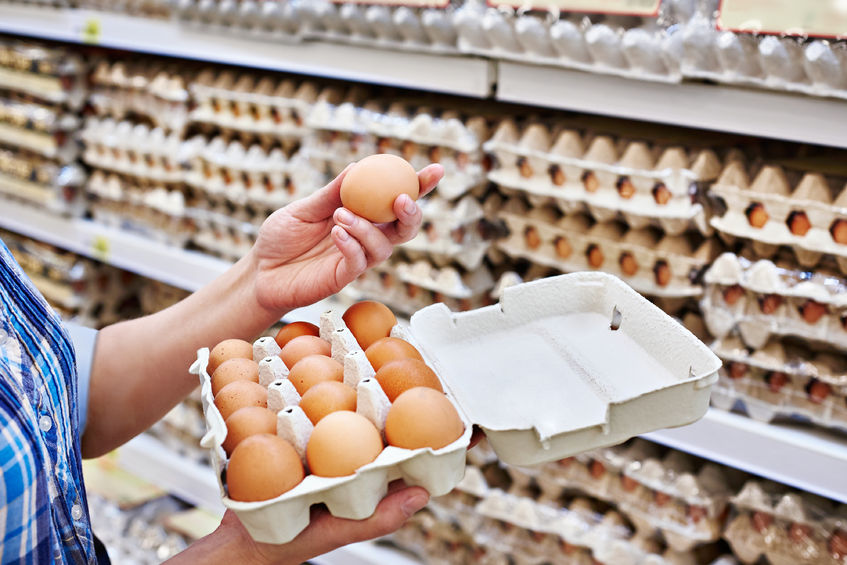
An animal rights group has launched an anti-cage campaign against Noble Foods, the United Kingdom's leading egg company.
The campaign, which is being reported by the national press, is being run by the Humane League and calls on Noble to commit to completely cage-free production by 2025.
All leading retailers in the United Kingdom, as well as leading foodservice companies have already said that they will source their eggs from only non-cage birds by that date following pressure from animal welfare groups. Humane League has now turned its attention to the country's biggest egg packer.
"Many of us no longer eat eggs but the vast majority of the world still does. When consumers buy free range eggs, they mainly do so because they want to avoid cruel farming practices," said Pru Elliott, Humane League's head of campaigns in a release announcing the campaign.
"However, when people buy eggs from the happy egg co, they are unwittingly supporting the caging of millions of animals. This simply isn't right," she said.
Good Egg Award
Noble's high welfare happy egg brand has been hugely successful for the company, selling in both the UK and the United States and securing a string of awards for the business.
In November last year Noble was presented with a Good Egg Award by Compassion in World Farming for its "commitment to providing humanely raised free range eggs to the US market."
Rachel Dreski, food business manager of Compassion in World Farming USA said at the time: “We congratulate the happy egg co on their Good Egg Award and commend them for going above and beyond for their birds.
“In the US we’re witnessing a major shift in attitude on how laying hens should be raised. The happy egg co is proof that higher welfare systems offering access to sunlight and pasture are possible on a large, affordable scale.”
4.3million hens
Despite the accolades, Humane League says that, whilst the company produces more than 60 million eggs a week, 4.3 million hens on Noble farms remain in cages.
Pru Elliott said: "Noble Foods has a policy to go 70 percent cage-free by 2020. Since it is already very close to this target, and millions of hens remain caged, this is clearly not strong enough progress.
"We're asking for Noble Foods to make a commitment to go 100 percent cage-free by 2025. If most of the UK's supermarkets and restaurants can do it, why can't the UK's leading egg company? Cage systems are immensely cruel.
"In a cage, a hen can't express important natural behaviours. She can barely even stretch her wings. It's time for Noble Foods to live up to its stated company values and stop inflicting this suffering on hens."
Cage-free in UK
At the annual conference of the British Free Range Egg Producers Association (BFREPA) in October Noble chief executive Dale Burnett spoke about the move towards cage-free in the UK market.
He said that the egg industry was still waiting to hear what retailers would replace cage eggs with come 2025. He was amongst a number of people calling for greater clarity from the retailers.
"The message about colony cage is that it will end in 2025. Very brave statements. What does it mean? What will replace it? This is the key message," Mr Burnett said.
He said there had been suggestions that some form of intensified barn system may replace colony eggs. "No-one has really nailed that properly down and said: 'We are doing that.'
"There have been suggestions of free range, but is it free range as we know it today or is it some form of intensive free range, which will allow for price tiering.
"What I do know is that the clock is ticking and, as an industry, we are going to have to respond to it. Obviously in this room I'm sure you all hope it's some form of free range.
"But we do need to get some clarity in the industry to be able to respond to consumer demands and consumer needs if the retailers carry out their suggested end date at some point in 2025," he said.
'Big and Fresh'
Alongside the successful happy egg brand, Noble also has a successful enriched cage brand called Big and Fresh.
Dale Burnett told delegates at the BFREPA conference that this brand would convert to whatever replaced enriched sourcing in 2025 - whether that was some form of barn or intensive free range egg.
Big UK retailers made their commitment to go cage-free following successful animal welfare campaigns.
Particularly influential was a petition by schoolgirl Lucy Gavaghan, from Sheffield. She initially aimed her campaign at Tesco.
Once Tesco committed to going cage-free, she turned her attention to other leading retailers. Asda and Morrisons subsequently made the cage-free commitment and they were followed by discounters Aldi and Lidl and then the convenience chain, Spar. Sainsbury’s, the Co-op, Waitrose and Marks and Spencer stopped selling cage eggs some years ago.
The UK is not the only country where companies have gone cage-free. In the United States major names like Subway, Costco, McDonald’s, Burger King, Nestle, Sodexo, Aramark, Heinz, Starbucks and Compass Group are all turning their backs on eggs from birds in cages.
Two leading cruise companies – Carnival and Royal Caribbean have also said that they intend to stop using eggs produced in cage systems. In Australia, Woolworths has said it will stop selling cage eggs by 2018.
